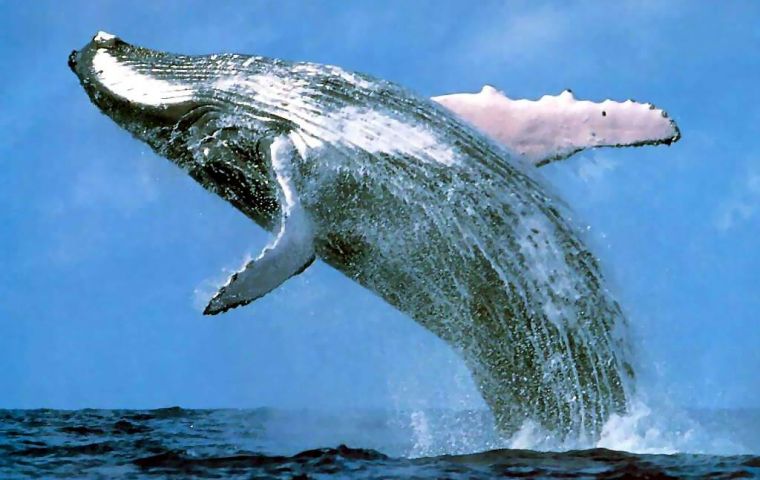MercoPress. South Atlantic News Agency
Japan and allies thwart South Atlantic Whale sanctuary at the IWC
 Whales migrating in the South Atlantic
Whales migrating in the South Atlantic By a vote of 38 in favour to 21 opposed, the South Atlantic Whale Sanctuary (SAWS) failed to meet the International Whaling Commission’s (IWC) required 3/4 majority to pass and be established.
Greenpeace and a vast coalition of environmental groups were calling on the IWC to establish the sanctuary that would have protected Southern Hemisphere whales from commercial whaling for their entire lives. The sanctuary would have been the first conservation measure put in place by the IWC since the commercial whaling moratorium was put in place in 1986.
“The IWC remains stuck in the past. A minority of countries that support commercial whaling can thwart the overwhelming majority of conservation minded nations” said Phil Kline, Senior Oceans Campaigner for Greenpeace.
Despite being requested by all Latin American nations attending the meeting, the sanctuary was defeated by the votes of nations located well outside the proposed sanctuary, many of which have strong ties to Japan.
“All the bordering nations of the proposed sanctuary, African and South American, voted in favour of it. We were pleased to see the strong support for this sanctuary but disappointed that it was denied by a political process aimed at resuming commercial whaling” said Kline. “It’s time the IWC is reformed to protect the whales, not the whalers”.
Most of the whales in the Southern Hemisphere are highly migratory, feeding in the nutrient rich waters of the Antarctic before travelling to tropical waters to give birth. They then make the long migration back to their feeding grounds in the South. The sanctuary would have ensured their protection from commercial whaling for their entire lives. This would assure the recovery of whale populations, promote conservation on both feeding and breeding grounds, and promote research while helping develop responsible whale watching that drive tourism for many coastal communities in South America.
“This is not the end. Greenpeace, our allies, and the nations who voted in favour will continue to work for this vital sanctuary in order to ensure the protection of whales for generations to come,” said Kline.




Top Comments
Disclaimer & comment rules-

-

-

Read all commentsDamn those Japs.
Jul 03rd, 2012 - 01:19 am 0That British sub in the South Atlantic should bump any Japanese whaling boats.
Now the Japanese population has reached certain levels I feel we can slaughter some of their number for “scientific purposes” without a detrimental effect on the wider population.
Jul 03rd, 2012 - 05:25 am 0Pure fascism, Boovis. I guess then it's a-OK for me to say the Britards should be bombed and have depleted uranium thrown at them until we find WMDs in your country. And this time there would be no mistake.
Jul 03rd, 2012 - 08:44 am 0Commenting for this story is now closed.
If you have a Facebook account, become a fan and comment on our Facebook Page!